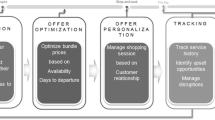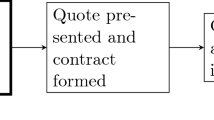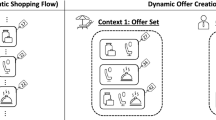Abstract
In this paper, we study the bundle design problem for offering personalized bundles of services using historical consumer redemption data. The problem studied here is for an operator managing multiple service providers, each responsible for an attraction, in a leisure park. Given the specific structure of interactions between service providers, consumers and the operator, a bundle of services is beneficial for the operator when the bundle is underutilized by service consumers. Such revenue structure is commonly seen in the cable television and leisure industries, creating strong incentives for the operator to design bundles containing lots of not-so-popular services. However, as customers might choose to bypass a bundle completely if it is not sufficiently attractive, we need to impose a quality of service (QoS) constraint on the lower bound of the perceived attractiveness. In this paper, we make two major contributions (1) recognizing the inherent differences in customer preferences, we propose an approach for detecting different user classes, and for each user class, make an appropriate bundle recommendation; and (2) in order to make the bundling scheme even more adaptive to unknown customer preferences, we propose a dynamic bundling strategy, which allows customers to “trade in” any number of undesirable services dynamically so that they can be replaced by an alternative set of services. A step to generate fixed or static bundles is also studied. The pros and cons of different bundling strategies are illustrated using a real-world dataset collected from a large leisure park operator in Asia that manages a large collection of attraction providers.
This work was done while the author was a post-doc at the Singapore Management University.
Access this chapter
Tax calculation will be finalised at checkout
Purchases are for personal use only
Similar content being viewed by others
References
Manoj K Agarwal and Subimal Chatterjee. Complexity, uniqueness, and similarity in between-bundle choice. Journal of Product & Brand Management, 12(6):358–376, 2003.
Rakesh Agrawal, Tomasz Imieliński, and Arun Swami. Mining association rules between sets of items in large databases. In ACM SIGMOD Record, volume 22, pages 207–216. ACM, 1993.
Rakesh Agrawal, Ramakrishnan Srikant, et al. Fast algorithms for mining association rules. In Proc. 20th int. conf. very large data bases, VLDB, volume 1215, pages 487–499, 1994.
T. W. Anderson and D.A. Darling. Asymptotic theory of certain “goodness of fit” criteria based on stochastic processes. The Annals of Mathematical Statistics, 23(2):193–212, 1952.
Mark Armstrong. A more general theory of commodity bundling. Journal of Economic Theory, 148(2):448–472, 2013.
Alessandro Avenali, Anna DÁnnunzio, and Pierfrancesco Reverberi. Bundling, competition and quality investment: a welfare analysis. Review of Industrial Organization, 43(3):221–241, 2013.
Yannis Bakos and Erik Brynjolfsson. Bundling information goods: Pricing, profits, and efficiency. Management Science, 45(12):1613–1630, 1999.
Yannis Bakos and Erik Brynjolfsson. Bundling and competition on the internet. Marketing Science, 19(1):63–82, 2000.
Moran Beladev, Bracha Shapira, and Lior Rokach. Recommender systems for product bundling. Knowledge-Based Systems, 111:193–206, 2016.
James Bennett and Stan Lanning. The netflix prize. In Proceedings of KDD cup and workshop, volume 2007, page 35, 2007.
D. Billsus and M.J. Pazzani. Learning collaborative information filters. In Proceedings of the 15th International Conference on Machine Learning (ICML’98), pages 46–54, 1998.
Enrico Calandro and Chenai Chair. Policy and regulatory challenges posed by emerging pricing strategies. Information Technologies & International Development, 12(2), 2016.
Kathryn A Carroll, Anya Savikhin Samek, Lydia Zepeda, et al. Product bundling as a behavioral nudge: Investigating consumer fruit and vegetable selection using dual-self theory. In 2016 Annual Meeting, July 31-August 2, 2016, Boston, Massachusetts, number 236130. Agricultural and Applied Economics Association, 2016.
Suchan Chae. Bundling subscription tv channels: A case of natural bundling. International Journal of Industrial Organization, 10(2):213–230, 1992.
Yongmin Chen. Equilibrium product bundling. Journal of Business, 70(1):85–103, 1997.
Yongmin Chen and Michael H Riordan. Profitability of product bundling. International Economic Review, 54(1):35–57, 2013.
Bing Tian Dai and Hady W Lauw. Modeling preferences with availability constraints. In 2013 IEEE 13th International Conference on Data Mining, pages 101–110. IEEE, 2013.
Gary D Eppen, Ward A Hanson, and R Kipp Martin. Bundling-new products, new markets, low risk. Purdue University, Krannert Graduate School of Management, 1991.
David S Evans and Karen L Webster. Designing the right product offerings. MIT Sloan Management Review, 49(1):44, 2007.
Esther Gal-Or. Evaluating the profitability of product bundling in the context of negotiations. The Journal of Business, 77(4):639–674, 2004.
Joshua S Gans and Stephen P King. Paying for loyalty: Product bundling in oligopoly. The Journal of Industrial Economics, 54(1):43–62, 2006.
Xianjun Geng, Maxwell B Stinchcombe, and Andrew B Whinston. Bundling information goods of decreasing value. Management science, 51(4):662–667, 2005.
G. Hamerly and C. Elkan. Learning the k in k-means. In Proceedings of the 17th Annual Conference on Neural Information Processing Systems (NIPS’03), pages 281–288, 2003.
Judy Harris and Edward A Blair. Consumer preference for product bundles: The role of reduced search costs. Journal of the Academy of Marketing Science, 34(4):506–513, 2006.
Michael D Johnson, Andreas Herrmann, and Hans H Bauer. The effects of price bundling on consumer evaluations of product offerings. International Journal of Research in Marketing, 16(2):129–142, 1999.
Yehuda Koren, Robert Bell, and Chris Volinsky. Matrix factorization techniques for recommender systems. Computer, 42(8):30–37, 2009.
V. Krishnan and Karl T. Ulrich. Product development decisions: A review of the literature. Management Science, 47(1):1–21, 2001.
Arthur Lewbel. Bundling of substitutes or complements. International Journal of Industrial Organization, 3(1):101–107, 1985.
Greg Linden, Brent Smith, and Jeremy York. Amazon. com recommendations: Item-to-item collaborative filtering. Internet Computing, IEEE, 7(1):76–80, 2003.
Qi Liu, Enhong Chen, Hui Xiong, Yong Ge, Zhongmou Li, and Xiang Wu. A cocktail approach for travel package recommendation. IEEE Transactions on Knowledge and Data Engineering, 26(2):278–293, 2014.
Silvano Martello, David Pisinger, and Paolo Toth. New trends in exact algorithms for the 0–1 knapsack problem. European Journal of Operational Research, 123(2):325–332, 2000.
R Preston McAfee, John McMillan, and Michael D Whinston. Multiproduct monopoly, commodity bundling, and correlation of values. The Quarterly Journal of Economics, 104:pages 371–383, 1989.
T.H. Nguyen, P.R. Varakantham, S-F. Cheng, and H.C. Lau. Mining resource bundles by balancing profitability. LARC-TR-01-14, Singapore Management University, 2014.
Dusit Niyato, Dinh Thai Hoang, Nguyen Cong Luong, Ping Wang, Dong In Kim, and Zhu Han. Smart data pricing models for the internet of things: a bundling strategy approach. IEEE Network, 30(2):18–25, 2016.
Brooks Pierce and Harold Winter. Pure vs. mixed commodity bundling. Review of Industrial Organization, 11(6):811–821, 1996.
Srinivasan Raghunathan and Sumit Sarkar. Competitive bundling in information markets: A seller-side analysis. MIS Quarterly, 40(1):111–131, 2016.
Elli Rapti, Anthony Karageorgos, and Georgios Ntalos. Adaptive constraint and rule-based product bundling in enterprise networks. In IEEE 23rd International WETICE Conference, pages 15–20. IEEE, 2014.
Jasson D.M. Rennie and Nathan Srebro. Fast maximum margin matrix factorization for collaborative prediction. In Proceedings of the 22nd International Conference on Machine learning, pages 713–719. ACM, 2005.
P. Resnick, N. Iacovou, M. Suchak, P. Bergstrom, and J. Riedl. Grouplens: an open architecture for collaborative filtering of netnews. In Proceedings of the 1994 ACM conference on Computer supported cooperative work, pages 175–186. ACM, 1994.
Francesco Ricci, Lior Rokach, and Bracha Shapira. Introduction to recommender systems handbook. Springer, 2011.
Badrul Sarwar, George Karypis, Joseph Konstan, and John Riedl. Item-based collaborative filtering recommendation algorithms. In Proceedings of the 10th International Conference on World Wide Web, pages 285–295. ACM, 2001.
Andrew I Schein, Alexandrin Popescul, Lyle H Ungar, and David M Pennock. Methods and metrics for cold-start recommendations. In Proceedings of the 25th Annual International ACM SIGIR Conference on Research and Development in Information Retrieval, pages 253–260. ACM, 2002.
Hanhuai Shan and Arindam Banerjee. Generalized probabilistic matrix factorizations for collaborative filtering. In Proceedings of the IEEE 10th International Conference on Data Mining (ICDM’10), pages 1025–1030. IEEE, 2010.
Mehdi Sheikhzadeh and Ehsan Elahi. Product bundling: Impacts of product heterogeneity and risk considerations. International Journal of Production Economics, 144(1):209–222, 2013.
Sandro Shelegia. Multiproduct pricing in oligopoly. International Journal of Industrial Organization, 30(2):231– 242, 2012.
Shibin Sheng, Andrew M Parker, and Kent Nakamoto. The effects of price discount and product complementarity on consumer evaluations of bundle components. Journal of Marketing Theory and Practice, 15(1):53–64, 2007.
Allan D Shocker, Barry L Bayus, and Namwoon Kim. Product complements and substitutes in the real world: The relevance of “other products”. Journal of Marketing, 68(1):28–40, 2004.
Nathan Srebro, Jason D.M. Rennie, and Tommi Jaakkola. Maximum-margin matrix factorization. In NIPS, volume 17, pages 1329–1336, 2004.
Stefan Stremersch and Gerard J Tellis. Strategic bundling of products and prices: A new synthesis for marketing. Journal of Marketing, 66(1):55–72, 2002.
Xiaoyuan Su and Taghi M Khoshgoftaar. A survey of collaborative filtering techniques. Advances in Artificial Intelligence, 2009:4, 2009.
Chang Tan, Qi Liu, Enhong Chen, Hui Xiong, and Xiang Wu. Object-oriented travel package recommendation. ACM Transactions on Intelligent Systems and Technology (TIST), 5(3):43, 2014.
M Mithat Üner, Faruk Güven, and S Tamer Cavusgil. Bundling of telecom offerings: An empirical investigation in the turkish market. Telecommunications Policy, 39(1):53–64, 2015.
Robin Van Meteren and Maarten Van Someren. Using content-based filtering for recommendation. In Proceedings of the Machine Learning in the New Information Age: MLnet/ECML2000 Workshop, 2000.
R Venkatesh and Wagner Kamakura. Optimal bundling and pricing under a monopoly: Contrasting complements and substitutes from independently valued products*. The Journal of Business, 76(2):211–231, 2003.
R Venkatesh and Vijay Mahajan. The design and pricing of bundles: a review of normative guidelines and practical approaches. Handbook of Pricing Research in Marketing, page 232, 2009.
Yuanhong Wang, Yang Liu, and Xiaohui Yu. Collaborative filtering with aspect-based opinion mining: A tensor factorization approach. In Proceedings of the IEEE 12th International Conference on Data Mining (ICDM’12), pages 1152–1157. IEEE, 2012.
Markus Weimer, Alexandros Karatzoglou, Quoc Viet Le, and Alex Smola. CofiRank: Maximum margin matrix factorization for collaborative ranking. In Proceedings of the 21th Annual Conference on Neural Information Processing Systems (NIPS’07), 2007.
Wann-Yih Wu, Badri Munir Sukoco, Chia-Ying Li, and Shu Hui Chen. An integrated multi-objective decision-making process for supplier selection with bundling problem. Expert Systems with Applications, 36(2):2327–2337, 2009.
Min Xie, Laks VS Lakshmanan, and Peter T Wood. Breaking out of the box of recommendations: from items to packages. In Proceedings of the fourth ACM conference on Recommender systems, pages 151–158. ACM, 2010.
Ruiliang Yan and Subir Bandyopadhyay. The profit benefits of bundle pricing of complementary products. Journal of Retailing and Consumer Services, 18(4):355–361, 2011.
Zhiwen Yu, Yun Feng, Huang Xu, and Xingshe Zhou. Recommending travel packages based on mobile crowdsourced data. IEEE Communications Magazine, 52(8):56–62, 2014.
Zhiwen Yu, Huang Xu, Zhe Yang, and Bin Guo. Personalized travel package with multi-point-of-interest recommendation based on crowdsourced user footprints. IEEE Transactions on Human-Machine Systems, 46(1):151–158, 2016.
Chengqi Zhang and Shichao Zhang. Association rule mining: models and algorithms. Springer-Verlag, 2002.
Mingyue Zhang and Jesse Bockstedt. Complements and substitutes in product recommendations: The differential effects on consumers’ willingness-to-pay. In Proceedings of the Joint Workshop on Interfaces and Human Decision Making for Recommender Systems co-located with ACM Conference on Recommender Systems (RecSys 2016), Boston, MA, USA, September 16, 2016., pages 36–43, 2016.
Sheng Zhang, Weihong Wang, James Ford, and Fillia Makedon. Learning from incomplete ratings using non-negative matrix factorization. In SDM, pages 549–553. SIAM, 2006.
Tao Zhu, Patrick Harrington, Junjun Li, and Lei Tang. Bundle recommendation in ecommerce. In Proceedings of the 37th international ACM SIGIR conference on Research & development in information retrieval, pages 657–666. ACM, 2014.
Acknowledgements
The authors would like to thank Shih-Fen Cheng, Pradeep Varankantham, and a number of un-named team members who contributed in various ways to this project. This research is supported by the Singapore National Research Foundation under its International Research Centre @ Singapore Funding Initiative and administered by the IDM Programme Office, Media Development Authority (MDA).
Author information
Authors and Affiliations
Corresponding author
Editor information
Editors and Affiliations
Rights and permissions
Copyright information
© 2019 Springer Nature Switzerland AG
About this chapter
Cite this chapter
Mısır, M., Lau, H.C. (2019). Towards Personalized Data-Driven Bundle Design with QoS Constraint. In: Moscato, P., de Vries, N. (eds) Business and Consumer Analytics: New Ideas. Springer, Cham. https://doi.org/10.1007/978-3-030-06222-4_23
Download citation
DOI: https://doi.org/10.1007/978-3-030-06222-4_23
Published:
Publisher Name: Springer, Cham
Print ISBN: 978-3-030-06221-7
Online ISBN: 978-3-030-06222-4
eBook Packages: Computer ScienceComputer Science (R0)




